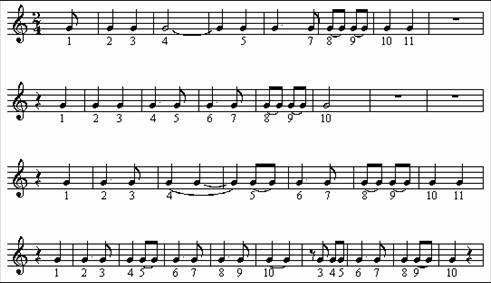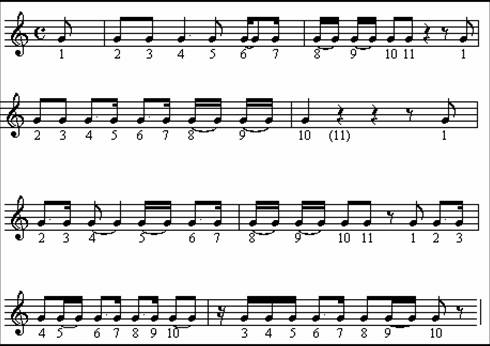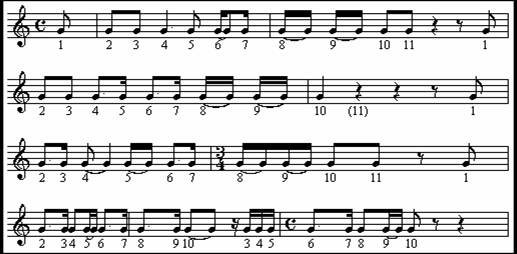Endecasílabos normalitos, alternando final que llaman femenino con masculino.
)Cómo músicarlos?. Lento por tema, anacrúsico por el metro y ahora el compás: aquí se nos presentan varias opciones:
Si elegimos dos sílabas por pulso (dos corcheas), como en el caso anterior, acabamos el verso con la acentuada (10) en la primera parte de un compás cuaternario (1 | 23 45 67 89 | 10), con lo que precisamos de casi tres pulsos vacíos de pausa antes de repetir el verso. Si es ternario (1 | 23 45 67 | 89 10 -1). Lo cual cuadra mejor porque la pausa queda breve aunque aparece. Veamos la solución del maestro. Pero aquí el compás no queda tan claro: como sabemos, en el endecasílabo las sílabas marcadas (generalmente acentuadas, aunque no siempre). Son 2, 4, 6, 8 y 10, con preeminencia de 2, 6 y 10 (a veces 2, 4 y 10).
La tendencia natural será considerar las no marcadas en situaciones débiles del compás, como anacrusas, y las marcadas, en partes fuertes, y las preeminentes en los Aunos@ del compás. Ensayemos con estas premisas diferentes compases, y evaluemos su satisfaccionalidad.
El compás binario va a cuadrar siempre con tal de tomar grupos simples de sílabas, en este caso correspondería
a un simple yambo por compás. Probemos dos posibilidades más, que ahora comentaremos:
|
|
|
|
|
|
Como se ve en las tres versiones anteriores, la binaria breve siempre cuadra, pasando a ser las irregularidades un número variable de compases. La versión cuaternaria es muy ambiciosa en su afán ordenador y cuadrador con lo que aparecen los versos musicalmente irregulares (figuras varias para las sílabas), como desajustes en el compás, perdiéndose la deseable cuadratura. La última versión, sí cuadra, pero a costa de interpretar las figuras del último verso, como agrupadas en un compás ternario (de hecho, tres). En efecto, en ese verso aparecen en los unos de los compases las sílabas 2, 8, 2, 8, 6, todas marcadas o preeminentes, recogiendo la repetición de parte del verso. Esto no implica que la partitura original use estos compases, sino que estos compases recogen la particular rítmica que Schubert a aplicado al texto de Schober.
Pero veamos brevemente la armonía que es, en este estilo y en muchos otros, definidora de acentos y compases.
Una vez vista, los cambios principales de armonía se dan, en efecto, en estos compases cuaternarios y también en los ternarios, donde, de hecho, se ven sucesivamente V, IV, dominante de la dominante y dominante del relativo menor y dominante (en principio con cuarta y sexta cadencial).
Se da aquí, pues en estos compases ternarios, una polirrítmia de ternario métrico y armónico contra un compás binario, sea dos por cuatro o cuatro por cuatro, este encabalgamiento o polirrítmia se produce en el último verso que dice Apara transportarme a un mundo mejor@, de modo que ese ternario parece convenir a ese transporte, com una pirueta espacial.
|
Du bist die Ruh, der Friede mild
Du bist die Ruh, Der Friede mild, Die Sehnsucht du Und was sie stillt.
Ich weihe dir Voll Lust und Schmerz Zur Wohnung hier Mein Aug und Herz.
Kehr ein bei mir, Und schließe du Still hinter dir Die Pforten zu.
Treib andern Schmerz Aus dieser Brust! Voll sei dies Herz Von deiner Lust.
Dies Augenzelt Von deinem Glanz Allein erhellt, O füll es ganz!
Text by Friedrich Rückert (1788‑1866) Set by A (Karl) Friedrich Curschmann (1805‑1841), "Ruhe der Liebe" (The peace of love), op. 16, 2, i (1837). A Fanny Mendelssohn ‑ Hensel (1805‑1847), "Du bist die Ruh" (You are peace), op. 7 no. 4. A Franz Schubert (1797‑1828), "Du bist die Ruh", D. 776.
|
Alternate translation
Thou art repose and gentle peace. All earthly woes where thou art cease.
Trouble shall flee far from my soul; My heart by thee shall be made whole.
In this domain, Oh reign supreme; Oh lasting make this blissful dream.
Thou heart's desire, bourne of rest, Come nigh and nigher to this lone breast
My tented eyes from gloom of night See Paradise, full of thy light.
Translation to English recollected by Alistair Campbell‑Dick from an unidentified songbook published in the 1930s
|
You are peace, the mild peace
You are peace, The mild peace, You are longing And what stills it.
I consecrate to you Full of pleasure and pain As a dwelling here My eyes and heart.
Come live with me, And close quietly behind you the gates.
Drive other pain Out of this breast May my heart be full With your pleasure.
The tabernacle of my eyes by your radiance alone is illumined, O fill it completely!
|
Tu sei la quiete
Tu sei la quiete, la dolce pace, tu sei desiderio e ciň che lo calma.
Io ti dedico, colmo di gioia e dolore, quale rifugio gli occhi e il cuore
Entra in me e rimani.
Translated to Italian by Vittorio Fellegara
Back to the Lied and Song Texts Page |
|
Der Musensohn
Durch Feld und Wald zu schweifen, Mein Liedchen wegzupfeifen, So geht's von Ort zu Ort! Und nach dem Takte reget Und nach dem Maß beweget Sich alles an mir fort.
Ich kann sie kaum erwarten, Die erste Blum' im Garten, Die erste Blüt' am Baum. Sie grüßen meine Lieder, Und kommt der Winter wieder, Sing ich noch jenen Traum.
Ich sing ihn in der Weite, Auf Eises Läng' und Breite, Da blüht der Winter schön! Auch diese Blüte schwindet, Und neue Freude findet Sich auf bebauten Höhn.
Denn wie ich bei der Linde Das junge Völkchen finde, Sogleich erreg ich sie. Der stumpfe Bursche bläht sich, Das steife Mädchen dreht sich Nach meiner Melodie.
Ihr gebt den Sohlen Flügel Und treibt durch Tal und Hügel Den Liebling weit von Haus. Ihr lieben, holden Musen, Wann ruh ich ihr am Busen Auch endlich wieder aus?
Text by Johann Wolfgang von Goethe (1749‑1832) Set by Ludwig Berger (1777‑1839) Johann Friedrich Reichardt (1752‑1814), 1809. Franz Schubert (1797‑1828), D. 764 (1822), op. 92 no. 1 (2nd version published 1828). Karl Friedrich Zelter (1758‑1832), 1807. |
The son of the muses
Roaming through field and wood, Piping along my little song, So I go from place to place! And to my beat And to my measure Everything moves with me.
I can hardly wait for them, The first bloom in the garden, The first blossom on the tree. My songs greet them, And when winter returns I still sing of that dream.
I sing them far and wide, Through the ice's realm, Then winter blossoms beautifully!
That bloom disappears too, And new joy is found In the hilltowns.
For when I, beside the linden, Encounter young folks, I rouse them at once. The swaggering youth puffs up, The naive maiden twirls To my melody.
You give my feet wings And drive through vale and hill Your favorite, far from home. You dear, kind muses, When on her bosom Will I finally again find rest?
|
Le fils des Muses
Errant par champs et foręts Sifflant gaiement ma chansonnette, Ainsi vais‑je de lieu en lieu Et ŕ mon rythme s'ébranlent Et ŕ ma mesure se meuvent Toutes choses autour de moi.
A peine puis‑je attendre La premičre fleur du jardin, la premičre pousse de l'arbre Elles saluent mes chansons, Et quand revient l'hiver, je chante encore ce ręve.
Je le chante ŕ travers l'espace, En large et en long sur la glace, L'hiver y fleurit en beauté; Mais cette fleur s'efface, Et une joie nouvelle s'installe Sur les collines bâties.
Car lorsque prčs du tilleul Je trouve une troupe jeune Je l'éveille aussitôt. Le garçon pataud se rengorge, La fillette si raide s'anime Au son de ma mélodie;
Aux pieds vous donnez des ailes Et menez par monts et par vaux Votre chérie loin de sa maison. Ô chčres belles Muses, Quand pourrai‑je enfin Reposer sur votre sein?
|
|
Heidenröslein
Sah ein Knab' ein Röslein stehn, Röslein auf der Heiden, War so jung und morgenschön, Lief er schnell, es nah zu sehn, Sah's mit vielen Freuden. Röslein, Röslein, Röslein rot, Röslein auf der Heiden.
Knabe sprach: Ich breche dich, Röslein auf der Heiden! Röslein sprach: Ich steche dich, Daß du ewig denkst an mich, Und ich will's nicht leiden. Röslein, Röslein, Röslein rot, Röslein auf der Heiden.
Und der wilde Knabe brach 's Röslein auf der Heiden; Röslein wehrte sich und stach, Half ihm doch kein Weh und Ach, Mußt es eben leiden. Röslein, Röslein, Röslein rot, Röslein auf der Heiden.
Text by Johann Wolfgang von Goethe (1749‑1832) Set by A Johannes Brahms (1833‑1897), WoO. 31 (1857), from Volks‑Kinderlieder, no. 6. Constantin Decker (1810‑1878), op. 2 no. 4. A Peter Grřnland (1761‑1825) A Rafael Joseffy (1852‑1915) A Johann Christoph Kienlen (1783‑1829), 1820. A Johann Friedrich Reichardt (1752‑1814), published 1794. A Karl Gottlieb Reissiger (1798‑1859), op. 79 no. 3. A Franz Schubert (1797‑1828), D. 257 [Midi with words] A Robert Alexander Schumann (1810‑1856), op. 67 no. 3 (1849). A (Karl Gottfried) Wilhelm Taubert (1811‑1891), op. 5 no. 2. A Václav Jan K`rtitel Tomá`sek (1774‑1850), op. 53 no. 1 (1815?), from Gedichte von Goethe, I:1. A August Heinrich von Weyrauch (1788‑1865)
|
Rose blossom on the heath
Passing lad a rose blossom spied, Blossom on the heath growing, 'Twas so fair and of youthful pride, Raced he fast to be near its side, Saw it with joy o'erflowing. Blossom, blossom, blossom red, Blossom on the heath growing.
Said the lad: I shall pick thee, Blossom on the heath growing! Blossom spoke: Then I'll prick thee, That thou shalt ever think of me, And I'll not be allowing. Blossom, blossom, blossom red, Blossom on the heath growing.
And the lusty lad did pick The blossom on the heath growing; Blossom, in defense, did prick, 'Twas, alas, but a harmless nick, Had to be allowing. Blossom, blossom, blossom red, Blossom on the heath growing.
Translation to English copyright 8 1996 by Walter Meyer
|
|
Wer reitet so spät durch Nacht und Wind?
Wer reitet so spät durch Nacht und Wind? Es ist der Vater mit seinem Kind; Er [hat]1 den Knaben wohl in dem Arm, Er [faßt]1 ihn sicher, er hält ihn warm.
+Mein Sohn, was birgst du so [bang]2 dein Gesicht?* ‑ +Siehst, Vater, du den Erlkönig nicht? Den Erlenkönig mit Kron und Schweif?* +Mein Sohn, es ist ein Nebelstreif.*
>Du liebes Kind, komm, geh mit mir! Gar schöne Spiele spiel ich mit dir; [Manch bunte Blumen sind an dem Strand]3, Meine Mutter hat manch gülden Gewand.<
+Mein Vater, mein Vater, und hörest du nicht, Was Erlenkönig mir [leise]4 verspricht?* +Sei ruhig, bleibe ruhig, mein Kind: In dürren Blättern säuselt der Wind.*
>Willst, feiner Knabe, du mit mir gehn? Meine Töchter sollen dich warten schön; Meine Töchter führen den nächtlichen Reihn Und wiegen und tanzen und singen dich ein.<
+Mein Vater, mein Vater, und siehst du nicht dort Erlkönigs Töchter am düstern Ort?* +Mein Sohn, mein Sohn, ich seh es genau: Es scheinen die alten Weiden so grau.*
>Ich liebe dich, mich reizt deine schöne Gestalt; Und bist du nicht willig, so brauch ich Gewalt.< +Mein Vater, mein Vater, jetzt faßt er mich an! Erlkönig hat mir ein Leids getan!*
Dem Vater grauset's, er reitet geschwind, Er hält in Armen das ächzende Kind, Erreicht den Hof mit Müh' und Not: In seinen Armen das Kind war tot.
Text by Johann Wolfgang von Goethe (1749‑1832) Set by Gottlob Bachmann (1763‑1840), "Erlkönig", op. 43, published 1798/99? A
|
Who's riding so late through night, so wild?
Who's riding so late through night, so wild? It is the father who's holding his child; He's tucked the boy secure in his arm, He holds him tight and keeps him warm.
My son, why hide you your face in fear?" See you not, father, the Erl King near? The Erl King in his crown and train?" My son, 'tis but a foggy strain."
Sweet lovely child, come, go with me! What wonderful games I'll play with thee; Flowers, most colorful, yours to behold. My mother for you has garments of gold."
My father, my father, and can you not hear What Erl King is promising into my ear?" Be calm, stay calm, o child of mine; The wind through dried leaves is rustling so fine."
Wouldst thou, fine lad, go forth with me? My daughters should royally wait upon thee; My daughters conduct each night their song fest To swing and to dance and to sing thee to rest."
My Father, my father, and can you not see Erl King's daughters, there by the tree?" My son, my son, I see it clear; The ancient willows so grey do appear."
I love thee, I'm aroused by thy beautiful form; And be thou not willing, I'll take thee by storm." My father, my father, he's clutching my arm! Erl King has done me a painful harm!"
The father shudders and onward presses; The gasping child in his arms he caresses; He reaches the courtyard, and barely inside, He holds in his arms the child who has died.
1 Spohr: "hält" 2 Spohr: "scheu" 3 Spohr: "Viel bunte Blumen sind am Strand" 4 Spohr: "heimlich" Translation 8 1995 by Walter Meyer Input by Ofer Sheinberg
|
Vuelta al Principio
Última
actualización:
Thursday, 21 de February de 2013 Visitantes:


